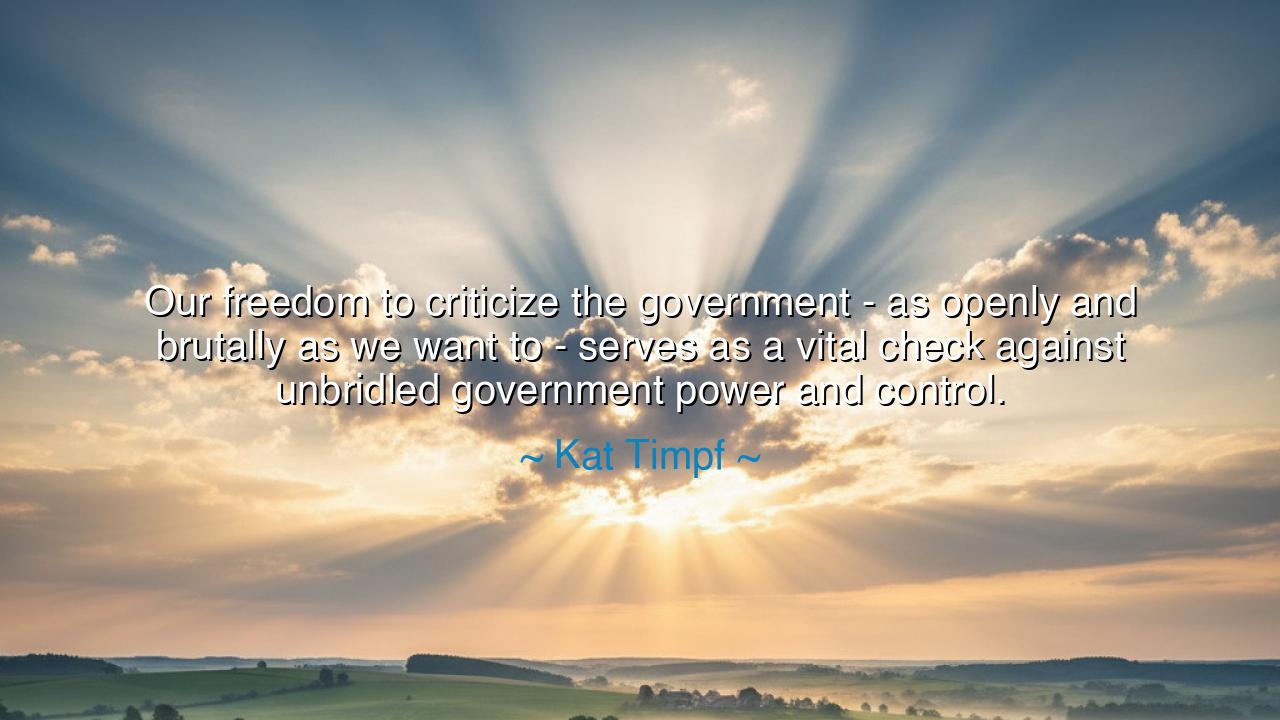
Our freedom to criticize the government - as openly and brutally
Our freedom to criticize the government - as openly and brutally as we want to - serves as a vital check against unbridled government power and control.






Opening Scene
The soft hum of the evening fills the room, the quiet rhythm of the city outside muffled by the windows. Jack and Jeeny sit together at the kitchen table, their mugs of tea steaming gently between them. The lamp casts a warm glow, creating a cozy atmosphere that contrasts with the weight of the conversation. The stillness in the room feels like a space for reflection, where deeper thoughts can unfold.
Host: The peace of the room feels almost deliberate, like a safe space where difficult ideas can be explored. Jeeny glances at Jack, sensing the shift in their conversation, before sharing something that has been on her mind.
Jeeny: (gently, her voice thoughtful) “I came across a quote from Kat Timpf that really stuck with me. She said, ‘Our freedom to criticize the government — as openly and brutally as we want to — serves as a vital check against unbridled government power and control.’ It’s such a powerful reminder of how crucial our right to speak out really is, isn’t it?”
Jack: (nodding, his voice reflective) “It really is. The ability to criticize the government openly is a cornerstone of democracy. It’s a safeguard against tyranny — the idea that if the government oversteps, the people have the power to call it out, to hold it accountable. That freedom is not just a right; it’s a protection, a vital line of defense against the abuse of power.”
Jeeny: (smiling softly, her voice calm) “Exactly. When we lose the freedom to criticize, we lose the power to keep those in power in check. Without the ability to speak openly, to question and challenge, the government becomes unchecked, and that’s when things start to shift in dangerous directions. It’s a fragile balance.”
Host: The quiet in the room seems deeper now, the weight of their conversation settling in between them. The gentle flicker of the lamp adds a sense of warmth, even as the ideas they are discussing feel more urgent. Jack leans forward slightly, his fingers lightly tracing the rim of his mug as he processes the depth of what Jeeny has said.
Jack: (softly, his voice more introspective) “It makes me realize just how powerful and important our freedom to criticize truly is. We often take it for granted, thinking that our voices will always be heard, but it’s easy to forget how quickly those freedoms can be stripped away. When the government feels untouchable, when people are afraid to speak up, the danger of unchecked power becomes all too real.”
Jeeny: (nodding, her voice calm but firm) “Yes. That’s why the right to criticize is so essential — it’s not just about expressing dissatisfaction, it’s about protecting our democracy. It’s about ensuring that those in power don’t become complacent, that they are reminded that they are accountable to the people. When people stop speaking out, when criticism becomes silenced, that’s when a democracy starts to decay.”
Host: The light in the room feels almost symbolic now, casting warmth over their words. The conversation has shifted from abstract ideas to something much more personal, a reminder of the fragile nature of the freedoms we enjoy. Jack’s fingers still lightly tap the edge of his mug, his expression thoughtful as the realization settles in.
Jack: (his voice quieter, almost resigned) “I think it’s easy to assume that our rights will always be there, that they’re permanent. But in reality, they need to be fought for, preserved. If we stop defending the freedom to speak out, to criticize the government, we start to lose the foundation of what makes democracy work. Without that freedom, everything else is at risk.”
Jeeny: (smiling softly, her voice affirming) “Exactly. Criticism isn’t just allowed; it’s necessary. It’s the voice of the people, reminding the government that it serves us, not the other way around. When we’re not afraid to speak out, when we use our voices, we keep the balance of power in check.”
Host: The stillness in the room feels almost profound, as if the conversation has reached a deeper understanding of the power that comes with freedom of speech. The world outside continues its steady pace, but inside, the realization has settled that the right to criticize is not just a freedom to use, but a responsibility to protect. The soft glow of the lamp casts a calming light on the realization that democracy is only as strong as the people’s willingness to speak up and challenge the powers that be.
Jack: (with a small, thoughtful smile, his voice reassured) “I think I understand now. The ability to criticize the government isn’t just a luxury — it’s a necessity. It’s a vital part of maintaining the system, of ensuring that power doesn’t run unchecked. Without it, everything else begins to fall apart.”
Jeeny: (nodding, her voice gentle) “Exactly. We can’t afford to take that freedom for granted. It’s the foundation of democracy, the force that keeps it alive.”
Host: The evening stretches on, but the room feels warmer now, as if the understanding between them has shifted into something more meaningful. The world outside continues, but inside, Jack and Jeeny sit in the quiet realization that the freedom to speak out, to criticize, is not just a right — it is the very essence of democracy. The evening continues, but in this moment, their conversation feels like a reminder that, as citizens, it is not just our privilege to question, but our duty to ensure that power is always kept in check.






AAdministratorAdministrator
Welcome, honored guests. Please leave a comment, we will respond soon